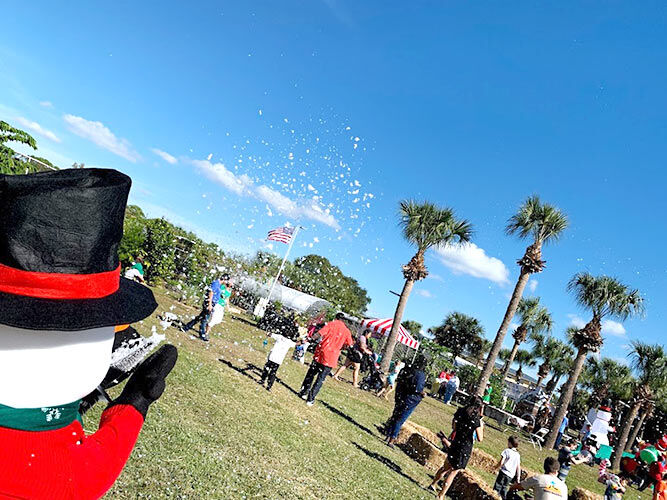
No one will put you into grammar prison for using the words interchangeably, but there are real differences between a carnival, fair and festival. They all have the goal of providing a fun time for many people, they just take slightly different routes to get there.
The basic differences between a carnival vs. a fair vs. a festival are as follows.
- Carnivals are typically traveling shows with a focus on fun games and thrilling rides
- Fairs are state-sponsored events that often have unique food, rides, games, and feature competitions (such as livestock judging and cooking contests)
- Festivals, while similar to carnivals and fairs, are tied to specific religious, seasonal, institutional or artistic events
The following provides a bit more detail for each.
What is a Carnival?
Like the circus, carnivals started as traveling shows that provided music, stage shows and other forms of entertainment for a scattered population separated by many miles. Modern traveling carnivals became popular in the 19th century. They include rides, games, music and dance, with performers working from town to town. They peaked in popularity during the Depression in the 1930s.
Today, people throw carnival-style parties that feature the types of event entertainment usually seen at classic carnivals, including a variety of games, food, dunking booths, thrill rides, slides and obstacle courses.
What is a Fair?
A fair has a lot in common with a carnival. However, it’s not a traveling show, and the scope is beyond rides, games, and entertainment. Most people know about fairs from state fairs, although there also are county fairs and city fairs. Fairs are typically community-sponsored with a whole portion of the event devoted to competitions such as livestock judging, equestrian events, and cooking contests (including barbecue, pie, cake and other tasty options).
While the classic, traveling carnivals have largely disappeared, fairs continue to thrive. They pop up all over the world and have a high attendance rate too. At a typical, modern fair you will find fairground attractions like rides, stalls, and aesthetic beauty stations too. For example, henna tattoos, hair braiding, and face painting. They are a place for local food traders to drum up some business and tend to run for about a week before they move on to the next area. They are a great way to bring communities together and provide an extended time period of entertainment for all ages. Lots of fairs will have arenas in the middle to showcase local talents such as animal shows or even classic car exhibits. Whatever the theme of the day, there is always something for everyone.
Spring Fair Planning Tips for Schools
Famous Fairs to Visit
There are lots of famous fairs that happen every year.
- Iowa State Fair: Expect carnival rides galore, excellent choices in food and drink, animals, and concerts too. There are lots of free attractions once you get in with your ticket purchase, and the whole event lasts for a whopping ten days!
- New York State Fair: This event lasts for around 13 days in total and brings together a collaboration of food stalls, sea lion exhibits, fun innovations like The Butterizer (See what you’d look like as a piece of butter), magician experiences, arts and crafts, military dedications and even old tractors. It is an eclectic hub of entertainment for the whole family.
- Arizona State Fair: Hosted in Phoenix, the Arizona State Fair is still going strong. Rodeos, monster trucks and tribute bands dominate the entertainment schedule, and you can expect all the usual trimmings too. Carnival rides like Ferris wheels and more, plus all the amazing food options are more than enough reason for Arizona to make the list of the ones to visit.
What is a Festival?
People use the term “festival” as a substitute for fair or carnival. But a festival is a bit different. Most festivals are tied to a religious holiday (a church’s Christmas Festival or Easter Festival), an academic institution (schools at all levels have a Fall Festival and Spring Festival), or artistic events (music, literary, and theatre festivals).
Festivals often have many of the same attractions as carnivals and fairs, including games, rides, and stage events. But event planners tie festivals thematically into whatever season, event, or artistic endeavor it focuses on.
Can You Rent Amusement Rides in Orlando?
What is the Most Famous Festival In The World?
This is a hard question because there are so many viable contenders up for consideration. The top of the list has to be the CARNIVAL from Brazil. Despite its name, this is very much a multi-cultural, multi-faceted festival event that attracts global attendance whenever it is on. Dancing, singing, food, festivities, wildness, and creativity rule the day and it really is one for the memories. From family friendly fun during the day to adult-only frivolity at night, Carnival has gained worldwide recognition for its sheer magnitude and excellent entertainment delivery. Every year, there are almost 5 million people flocking to the streets of Brazil and it has even been dubbed the greatest show to ever exist on Earth.
Those are the main differences when it comes to carnivals vs. fairs vs. festivals. People swap one for the other all the time. There’s nothing wrong with that. But if the topic ever comes up – or you’re trying to correctly name your event – it’s good to know the differences.


Thanks for all of this information. I have always used the terms interchangeably; no longer will. I’d like to try the Arizona State Fair.